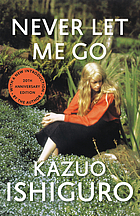You find out what’s going on in this 1980s (date assumed because of a cassette tape as an item of importance) British dystopia, bit by bit, just as its subjects do, so I’m hesitant to write much about it. I do think you should read it, and without knowing too much going in.
It’s a rich read, giving you a lot to think about, but it’s in no way dense or cumbersome to understand. The characters are incredibly realistic--I bet everyone knows a social climbing queen bee that while transparent is compelling enough in their manipulations that you still can’t help but want to please them.
What I’m thinking about the most right now are the people who tried to make things better for the downtrodden. To me their ineffective liberalism is central to the novel, but I wonder how many other people identify their efforts as liberal (vs. radical) and how central it even is. I’ll just have to wait for la c-dog to read the book, so we can bookclub it.
CATS: Nope. I recently tried the Cat Who series, thinking that would be a great way to up my books with cats quotient, but I couldn’t get into it.

Comments
Marion (not verified)
Wed, 05/18/2011 - 3:43pm
Permalink
I like your take on the
I like your take on the "misguided liberal do-gooder" politics inherent in the story. I could see this as a good read especially for YA's, but I found it disappointing. It was dystopian fiction by a literary writer, and it read like he'd never read any other dystopian novels ever. It was too much of a parable for me. I kept seeing major plot holes, not the obvious ones like not rebelling against your fate, but other ones. Once it was established that they can drive cars, and be out int the world, the question arises: What keeps the clones and non-clones from falling in love? Even if the clones don't question the order of things, why isn't SOMEONE?. I also felt too aware of the narrative tricks, particularly the way the unreliable narrator is used which wasn't nearly as clever as in The Remains of the Day, but recalled it.